-
ORIGINAL ARTICLE03-11-2024
Ethnically distinct populations and coping with violence against children in the COVID-19 pandemic
Revista Brasileira de Enfermagem. 2024;77:e20230350
Abstract
ORIGINAL ARTICLEEthnically distinct populations and coping with violence against children in the COVID-19 pandemic
Revista Brasileira de Enfermagem. 2024;77:e20230350
DOI 10.1590/0034-7167-2023-0350
Views0See moreABSTRACT
Objective:
To identify policies and programs adopted by a Brazilian municipality to address violence against children during the COVID-19 pandemic.
Method:
A qualitative documentary study. The study setting was the municipality of Ananindeua, Pará, Brazil. Data was collected from official websites between November 2021 and February 2022. Thematic content analysis was used with the support of webQDA software.
Results:
Three empirical categories emerged: a) Impacts of the COVID-19 pandemic on violence against children; b) Action strategies for tackling violence against children in the COVID-19 pandemic; c) Evaluation indicators and targets for action strategies for tackling violence against children.
Final considerations:
The documents revealed few direct mentions of children, especially traditional populations; they presented superficial and ineffective evaluations of the policies and programs adopted, using exclusively quantitative indicators.
-
ORIGINAL ARTICLE03-11-2024
Experiences of women with physical disabilities in labor and delivery assistance
Revista Brasileira de Enfermagem. 2024;77:e20230290
Abstract
ORIGINAL ARTICLEExperiences of women with physical disabilities in labor and delivery assistance
Revista Brasileira de Enfermagem. 2024;77:e20230290
DOI 10.1590/0034-7167-2023-0290
Views0See moreABSTRACT
Objective:
To understand the meaning attributed by women with physical disabilities to the health care received and expected during labor and delivery.
Methods:
Qualitative study, based on Social Network Theory, conducted through an online workshop in April 2022, with the participation of six women with physical disabilities. Data, collected through the focus group technique, underwent thematic content analysis with the assistance of the IRaMuTeQ tool.
Results:
Three thematic categories emerged: Challenges experienced during pregnancy; The experience within the maternity ward; and, The importance of social networks. The assistance provided by healthcare professionals sometimes differed between what was expected and what was received by women with physical disabilities during labor and delivery.
Final Considerations:
Experiences were predominantly negative, resulting from inappropriate professional conduct due to ableist attitudes. Support from members of social networks is crucial for preventing stressors.

-
03-11-2024
O uso da ultrassonografia point-of-care na prática clínica do enfermeiro como alicerce para a segurança do paciente
Revista Brasileira de Enfermagem. 2024;77:e77suppl0201
Abstract
O uso da ultrassonografia point-of-care na prática clínica do enfermeiro como alicerce para a segurança do paciente
Revista Brasileira de Enfermagem. 2024;77:e77suppl0201
DOI 10.1590/0034-7167.202477suppl0201pt
Views0Recentemente, mais um caso de dano grave associado ao cuidado em saúde foi reportado pela mídia. Uma jovem grávida teve a mão e o punho amputados depois de dar à luz ao terceiro filho em um hospital do Rio de Janeiro(). Após o incidente ocasionado pelo acesso vascular, a mulher apresentou hemorragia e foi reinternada.Os […]See more -
REVIEW03-11-2024
Continuing nursing education actions in the face of homophobia: an integrative review
Revista Brasileira de Enfermagem. 2024;77:e20230094
Abstract
REVIEWContinuing nursing education actions in the face of homophobia: an integrative review
Revista Brasileira de Enfermagem. 2024;77:e20230094
DOI 10.1590/0034-7167-2023-0094
Views0See moreABSTRACT
Objectives:
to analyze continuing nursing education actions in the scientific literature in the face of homophobia.
Methods:
an integrative literature review with structured search in June 2022 in eight databases, using the descriptors Nursing Education, Homophobia, Sexual and Gender Minorities. Final sample consisted of six primary studies.
Results:
continuing nursing education actions are supported by strategies such as use of teaching materials, lectures, case studies and focus groups, addressing content such as gender identity issues and affective-sexual orientation, health disparities and their relationship with homophobia in healthcare settings.
Final considerations:
carried out in various healthcare settings, continuing education actions proved to be successful in raising nurses’ awareness in facing homophobia in health services, however, their expansion is necessary to create health spaces that meet the specific needs of these people.

-
03-11-2024
The use of point-of-care ultrasound in nurses’ clinical practice as a foundation for patient safety
Revista Brasileira de Enfermagem. 2024;77:e77suppl0201
Abstract
The use of point-of-care ultrasound in nurses’ clinical practice as a foundation for patient safety
Revista Brasileira de Enfermagem. 2024;77:e77suppl0201
DOI 10.1590/0034-7167.202477suppl0201
Views0Recently, another case of serious harm associated with healthcare was reported by the media. A young pregnant woman had her hand and wrist amputated after giving birth to her third child in a hospital in Rio de Janeiro(). After the incident caused by vascular access, the woman suffered hemorrhage and was readmitted.The harm caused to […]See more -
03-08-2024
A enfermagem como protagonista no enfrentamento da hesitação e recusa vacinal
Revista Brasileira de Enfermagem. 2024;77:e77suppl101
Abstract
A enfermagem como protagonista no enfrentamento da hesitação e recusa vacinal
Revista Brasileira de Enfermagem. 2024;77:e77suppl101
DOI 10.1590/0034-7167.202477suppl101pt
Views0Desde a década de 1970, o Ministério da Saúde do Brasil instituiu o Programa Nacional de Imunização (PNI), que precedeu o Sistema Único de Saúde e que lhe foi incorporado e fortalecido, devido ao modelo descentralizado aos municípios, mas de comando único ao nível central. Seu objetivo era e ainda é coordenar as ações de […]See more -
03-08-2024
Nursing as a player in tackling vaccine hesitancy and refusal
Revista Brasileira de Enfermagem. 2024;77:e77suppl101
Abstract
Nursing as a player in tackling vaccine hesitancy and refusal
Revista Brasileira de Enfermagem. 2024;77:e77suppl101
DOI 10.1590/0034-7167.202477suppl101
Views1Since the 1970s, the Brazilian Ministry of Health established the Brazilian National Immunization Program (PNI – Programa Nacional de Imunização), which preceded the Brazilian Health System and which was incorporated and strengthened due to the decentralized model to municipalities, but under single command at central level. Its objective was and still is to coordinate vaccination […]See more -
02-26-2024
Nurse Navigator of Cancer Patients: contributions to the discussion on the national stage
Revista Brasileira de Enfermagem. 2024;77(2):e770201
Abstract
Nurse Navigator of Cancer Patients: contributions to the discussion on the national stage
Revista Brasileira de Enfermagem. 2024;77(2):e770201
DOI 10.1590/0034-7167.2024770201
Views0The professional practice of patient navigation is incipient in Brazil and, therefore, a broad discussion with various sectors of society is essential, which is the main purpose of this editorial. Shall we start with the story.Patient navigation was defined in 1989 as a community-based service delivery intervention aimed at appropriately promoting access to diagnosis and […]See more
-
ORIGINAL ARTICLE09-26-2022
Educational technology for infants’ families to identify warning signs: a validation study
Revista Brasileira de Enfermagem. 2022;75(5):e20210964
Abstract
ORIGINAL ARTICLEEducational technology for infants’ families to identify warning signs: a validation study
Revista Brasileira de Enfermagem. 2022;75(5):e20210964
DOI 10.1590/0034-7167-2021-0964
Views0See moreABSTRACT
Objective:
To validate, with the target audience, the usability and appearance of a serialized album about the warning signs to the health of children below 2 months.
Method:
Methodological validation study with the target population of an educational material in the form of a serialized album. 11 mothers with children under 2 months of age participated. The domains evaluated were: Objectives, Organization, Writing Style, Appearance, and Motivation. Data were analyzed using descriptive and statistics, and the data agreement index was calculated.
Results:
The global data agreement index was high (0.99). Mothers had positive responses, recognizing the excellence of the material: attractive figures that were easy to understand.
Conclusion:
The validation of the serialized album provides mothers with the abilities and knowledge they need to identify warning signs in regard to the health of their children, providing them with autonomy, corresponsibility, and helping them develop better child health practices.
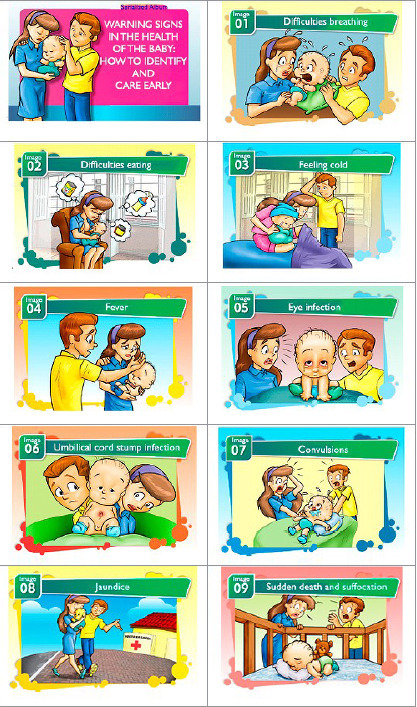
-
ORIGINAL ARTICLE10-17-2022
Validation of the Brazilian Portuguese version of the Venous International Assessment Scale and proposal of revision
Revista Brasileira de Enfermagem. 2022;75(5):e20220100
Abstract
ORIGINAL ARTICLEValidation of the Brazilian Portuguese version of the Venous International Assessment Scale and proposal of revision
Revista Brasileira de Enfermagem. 2022;75(5):e20220100
DOI 10.1590/0034-7167-2022-0100
Views0See moreABSTRACT
Objective:
To validate the Brazilian Portuguese translation and analyze the cultural adaptation of the Venous International Assessment Scale.
Methods:
Observational study by employing the Delphi technique and an equivalence evaluation by experts. The results were analyzed using item scores and by content validity index calculations of item, scale, and universal agreement.
Results:
Three rounds of evaluation were necessary for consensus. Explanatory contents were incorporated into the original scale throughout the process, resulting in a new version: VIA Scale – Revised. This scale obtained a content validity index of 0.96 and a universal agreement of 0.78. In the cross-cultural adequacy analysis phase, a score of 0.77 was obtained. The majority (90.5%) of the participants judged the scale’s decision support property as positive.
Conclusion:
The VIA Scale was validated and culturally adapted to the Brazilian Portuguese language, resulting in the VIA Scale – Revised (VIA-R).
-
ORIGINAL ARTICLE07-29-2022
Effects of guided imagery relaxation in hematopoietic stem-cell transplantation patients: a quasi-experimental study
Revista Brasileira de Enfermagem. 2022;75(5):e20220114
Abstract
ORIGINAL ARTICLEEffects of guided imagery relaxation in hematopoietic stem-cell transplantation patients: a quasi-experimental study
Revista Brasileira de Enfermagem. 2022;75(5):e20220114
DOI 10.1590/0034-7167-2022-0114
Views1See moreABSTRACT
Objective:
To analyze the effects of the technique of virtual reality guided imagery in the vital signs of hematopoietic stem-cell transplantation patients.
Method:
Quasi-experimental study with 35 participants who received an intervention using virtual reality guided imagery with progressive muscle relaxation, applied three times a week for four weeks in a referral hospital for transplants in the south of Brazil. Data collected included: temperature, arterial pressure, respiratory rate, heart rate, pain, and oxygen saturation, before and after each intervention. The comparisons were analyzed using Wilcoxon’s test.
Results:
There was a clinical significance between the mean measurements before and after for respiratory rate (p=0.00) in all stages, and for the variables Heart rate, Temperature, and Oxygen saturation from the 1st to the 12th measurements (p=0.05).
Conclusion:
The intervention was low cost, easy to apply, and showed positive effects, presenting itself as an option for patient-focused care.
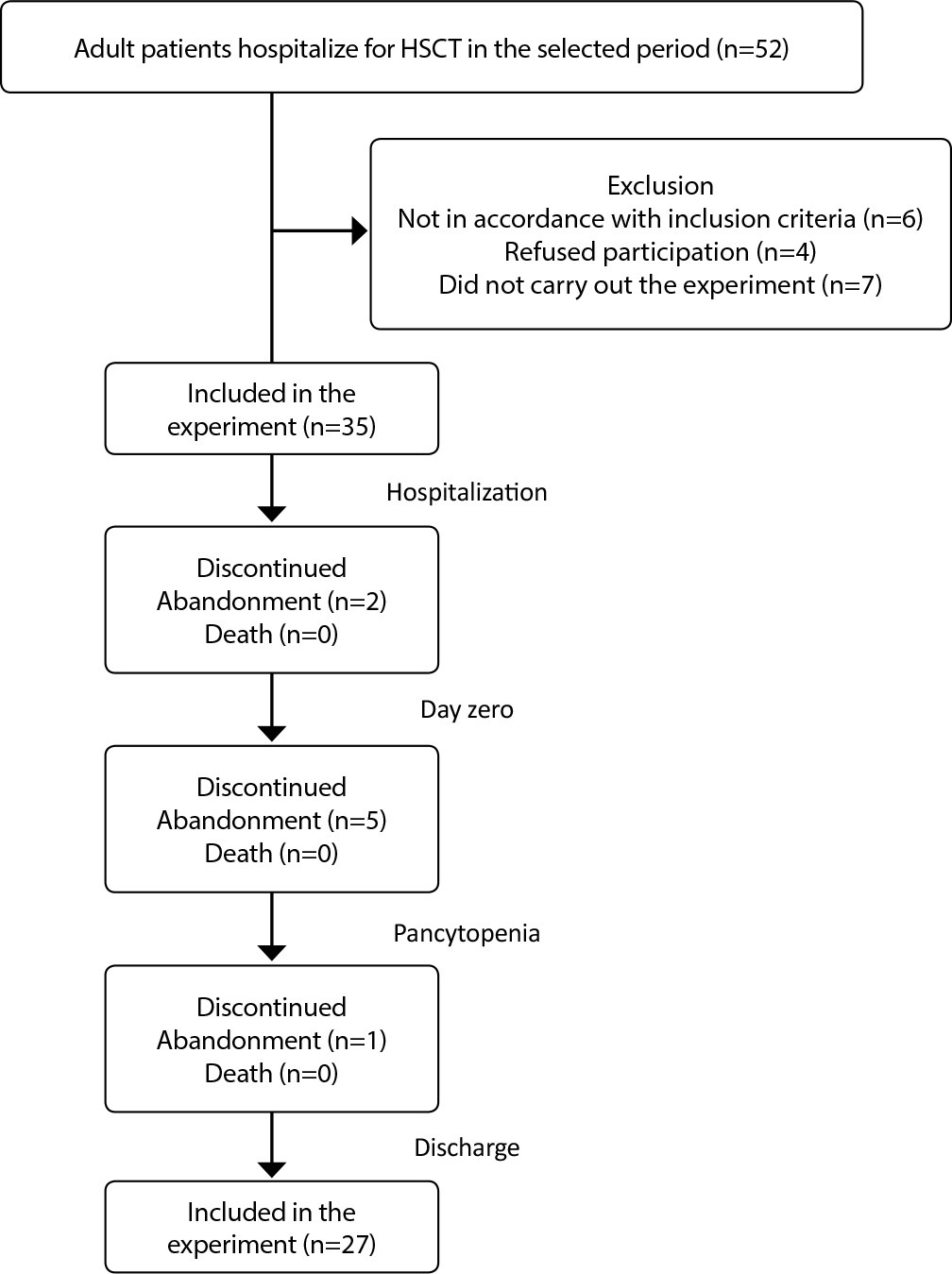
-
ORIGINAL ARTICLE10-17-2022
Semantic validation of educational technology with caregivers of children and adolescents undergoing chemotherapy
Revista Brasileira de Enfermagem. 2022;75(5):e20220294
Abstract
ORIGINAL ARTICLESemantic validation of educational technology with caregivers of children and adolescents undergoing chemotherapy
Revista Brasileira de Enfermagem. 2022;75(5):e20220294
DOI 10.1590/0034-7167-2022-0294
Views0See moreABSTRACT
Objective:
Semantically validate an educational technology with the caregiver of children and adolescents undergoing chemotherapy.
Method:
Methodological study, with a quantitative approach, guided by the theoretical framework of psychometry, developed between March and April 2022, with nine caregivers of children and adolescents undergoing chemotherapy. Educational technology is a digital animation film about the pediatric chemotherapy treatment process, used as a tool for health education.
Results:
In the reliability assessment, the Intraclass Correlation Coefficient was 0.936 [95%CI 0.868-0.984] with p < 0.05 and Cronbach’s alpha of 0.943, demonstrating satisfactory internal consistency. Regarding the semantic analysis, the domains related to objectives, organization, language, appearance, and motivation showed an agreement rate above 80%.
Conclusion:
Educational technology showed satisfactory rates, proving to be a valid, reliable, and important instrument to be used by caregivers of children and adolescents undergoing chemotherapy.
-
10-21-2022
Cancer symptom clusters: from the lab bench to clinical practice
Revista Brasileira de Enfermagem. 2022;75(5):e2022v75n5inov
Abstract
Cancer symptom clusters: from the lab bench to clinical practice
Revista Brasileira de Enfermagem. 2022;75(5):e2022v75n5inov
DOI 10.1590/0034-7167-2022v75n5inov
Views0See moreABSTRACT
Objective:
to present and discuss the advancement of science in symptom management through research involving oncological symptom clusters (OSC).
Method:
a reflective study, supported by the scientific literature on OSC.
Results:
five key points are crucial to advancing the science of symptom management through research involving OSC: definition of OSC characteristics; underlying mechanisms and priority symptom clusters; OSC measurement; targeted and personalized interventions; new analytical strategies.
Final considerations:
a better understanding of the complex connections between different systems and biobehavioral aspects in patients, especially in the field of oncology nursing, is urgent. The study of these interactions has become increasingly promising and emerging for oncology nursing, since therapeutic interventions, whose target is the neuroimmunoendocrine axis, are relevant for personalized care, translating into greater scientific and nurse autonomy to care for patients.
-
ORIGINAL ARTICLE06-24-2022
Prevalence of the Human Immunodeficiency Virus and associated factors in pregnant women in the state of Pará
Revista Brasileira de Enfermagem. 2022;75(6):e20210171
Abstract
ORIGINAL ARTICLEPrevalence of the Human Immunodeficiency Virus and associated factors in pregnant women in the state of Pará
Revista Brasileira de Enfermagem. 2022;75(6):e20210171
DOI 10.1590/0034-7167-2021-0171
Views0See moreABSTRACT
Objectives:
to analyze the prevalence of the Human Immunodeficiency Virus and the associated factors in pregnant women in the state of Pará.
Methods:
retrospective, analytical, quantitative study with a sample of 332 medical records of HIV-positive pregnant women hospitalized at the Referral Maternity Hospital in the state of Pará between 2010 and 2019. Bivariate and multivariate statistical analysis were performed with the variables collected.
Results:
the average prevalence in the period was 2.39% and the Metropolitan Region concentrated 66.87% of cases. There was a strong relationship between the number of antenatal consultations and lack of knowledge of serological status (p value equal to 0.01E-17) variables, and a correlation between the education and number of antenatal consultations variables.
Conclusions:
the increase in the infection rate during the study period revealed the need to intensify health actions, early diagnosis and strategies to improve adherence to antiretroviral treatment for maternal viral suppression and reduction of the risk of vertical transmission, contributing to improve public policies.
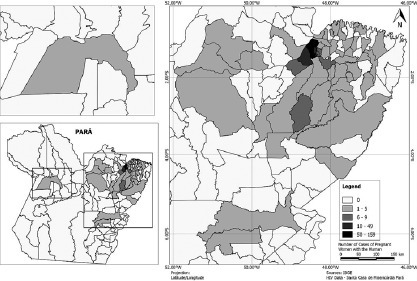
-
ORIGINAL ARTICLE10-03-2022
Evaluation of respiratory complications in a cohort of preterm infants who did not receive palivizumab monoclonal antibodies
Revista Brasileira de Enfermagem. 2022;75(6):e20210362
Abstract
ORIGINAL ARTICLEEvaluation of respiratory complications in a cohort of preterm infants who did not receive palivizumab monoclonal antibodies
Revista Brasileira de Enfermagem. 2022;75(6):e20210362
DOI 10.1590/0034-7167-2021-0362
Views0See moreABSTRACT
Objectives:
to analyze the occurrence of respiratory complications over the first year of life in preterm infants who did not receive palivizumab monoclonal antibodies.
Methods:
analytical retrospective cohort study with preterm infants born between 2012 and 2016 in Uberlândia, state of Minas Gerais, Brazil. Data collection occurred from January to November 2018, by consulting hospital and primary healthcare medical records. Data were processed with the Poisson regression model, with p<0.05.
Results:
of a total of 5,213 preterm births, 504 (9.7%) met the inclusion criteria. The preterm infants in this subset were assisted 2,899 times in primary care, which resulted in 1,098 (37.5%) medical diagnoses, of which 803 (78.5%) involved the respiratory tract. Preterm babies fed on formula milk at hospital discharge had more diagnoses of respiratory diseases. Maternal age (p=0.039), respiratory diagnosis at hospital discharge (p=0.028), and number of sporadic appointments (p<0.001) showed a significant association with bronchiolitis; number of sporadic appointments showed a significant association with occurrence of respiratory diseases; and breastfeeding had a protective effect against the development of bronchiolitis.
Conclusions:
preterm infants who did not receive palivizumab showed a high percentage of respiratory diseases, and breastfeeding helped protect them against bronchiolitis. It is recommended that these preterm babies be monitored in primary health care.
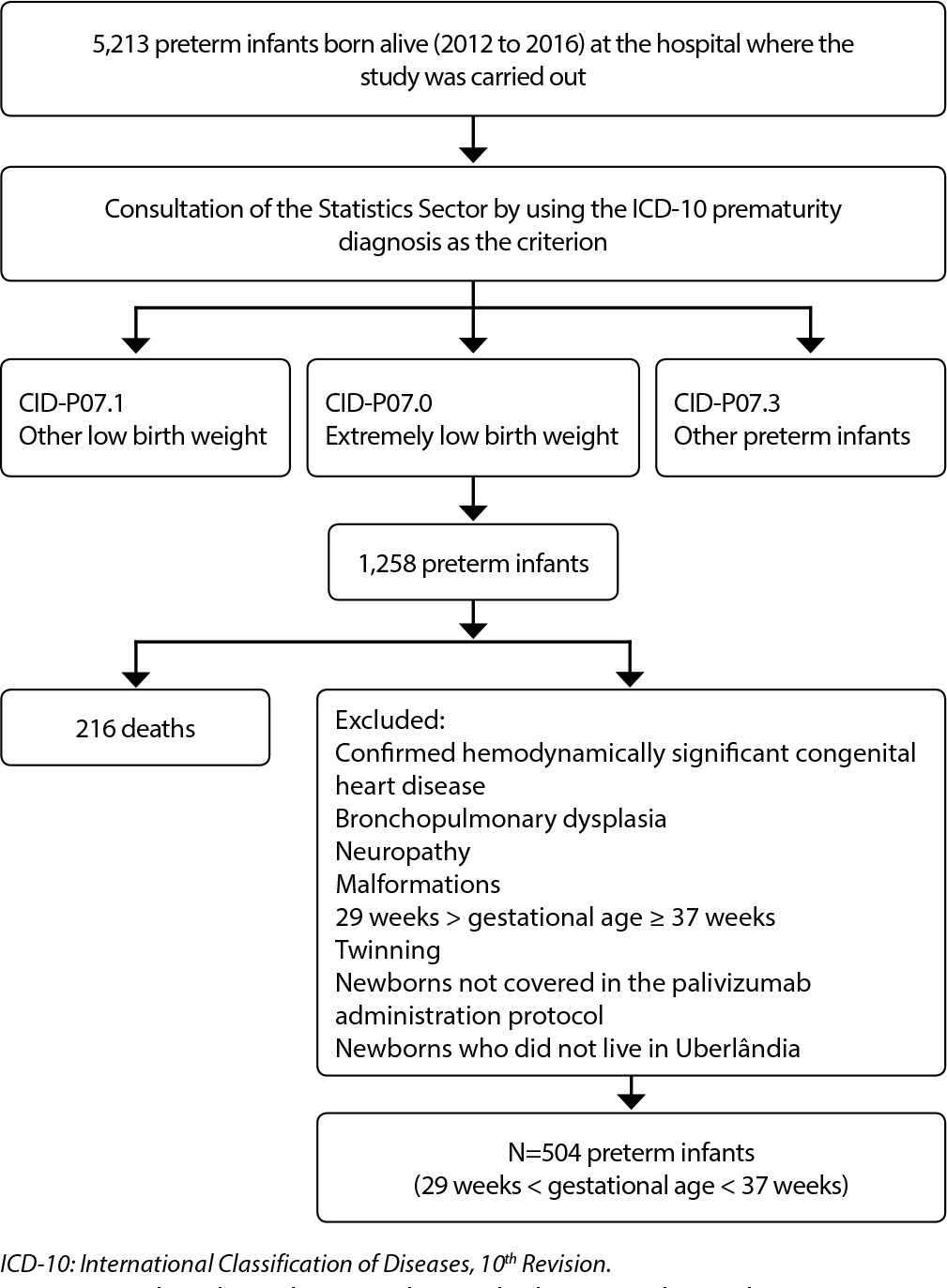
-
ORIGINAL ARTICLE09-09-2022
Palliative care management by caregivers in home care: theoretical validation in a conversation circle
Revista Brasileira de Enfermagem. 2022;75(6):e20210737
Abstract
ORIGINAL ARTICLEPalliative care management by caregivers in home care: theoretical validation in a conversation circle
Revista Brasileira de Enfermagem. 2022;75(6):e20210737
DOI 10.1590/0034-7167-2021-0737
Views0See moreABSTRACT
Objectives:
to present the validation process of a Grounded Theory on the management of palliative care at home by a caregiver of a family member who experiences a death/dying process.
Methods:
a qualitative, explanatory research, which validated a theoretical matrix through a conversation circle containing 15 family caregivers and nine healthcare professionals, in December 2018.
Results:
forty-six propositions were validated regarding family caregivers’ contextual, causal, intervening conditions, consequences and action strategies to deal with the dying and death process of a family member. Conversation circles encouraged dialogue and (re)signification of the senses and knowledge of those involved, proving to be a way of educating and promoting the exercise of citizenship by participants.
Final Considerations:
the conversation circle made it possible for participants to interact and share information and experiences regarding home care for palliative patients and their families.

-
ORIGINAL ARTICLE06-01-2020
Workplace violence types in family health, offenders, reactions, and problems experienced
Revista Brasileira de Enfermagem. 2020;73:e20190055
Abstract
ORIGINAL ARTICLEWorkplace violence types in family health, offenders, reactions, and problems experienced
Revista Brasileira de Enfermagem. 2020;73:e20190055
DOI 10.1590/0034-7167-2019-0055
Views0See moreABSTRACT
Objective:
to identify the types of violence that affect the health team in Family Health Units, their offenders, reactions and problems experienced by workers.
Method:
a cross-sectional, concurrent mixed-type research. The Survey Questionnaire Workplace Violence in the Health Sector was applied to 106 workers from Family Health Units. Of these, 18 answered the semi-structured interview.
Results:
verbal aggression (65.1%), bullying (14.2%), racial discrimination (10.4%), physical assault (8.5%) and sexual harassment (4.7%) were prevalent. Patients were the main perpetrators of verbal aggression (79.4%) and bullying (46.7%). Workers responded by telling co-workers and reporting to the boss. Victims remained over-alert, vigilant and tense, relating exposure to violence to absenteeism and the desire to leave the profession.
Conclusion:
verbal aggression is the most common violence with negative impact on workers’ health and work performed.
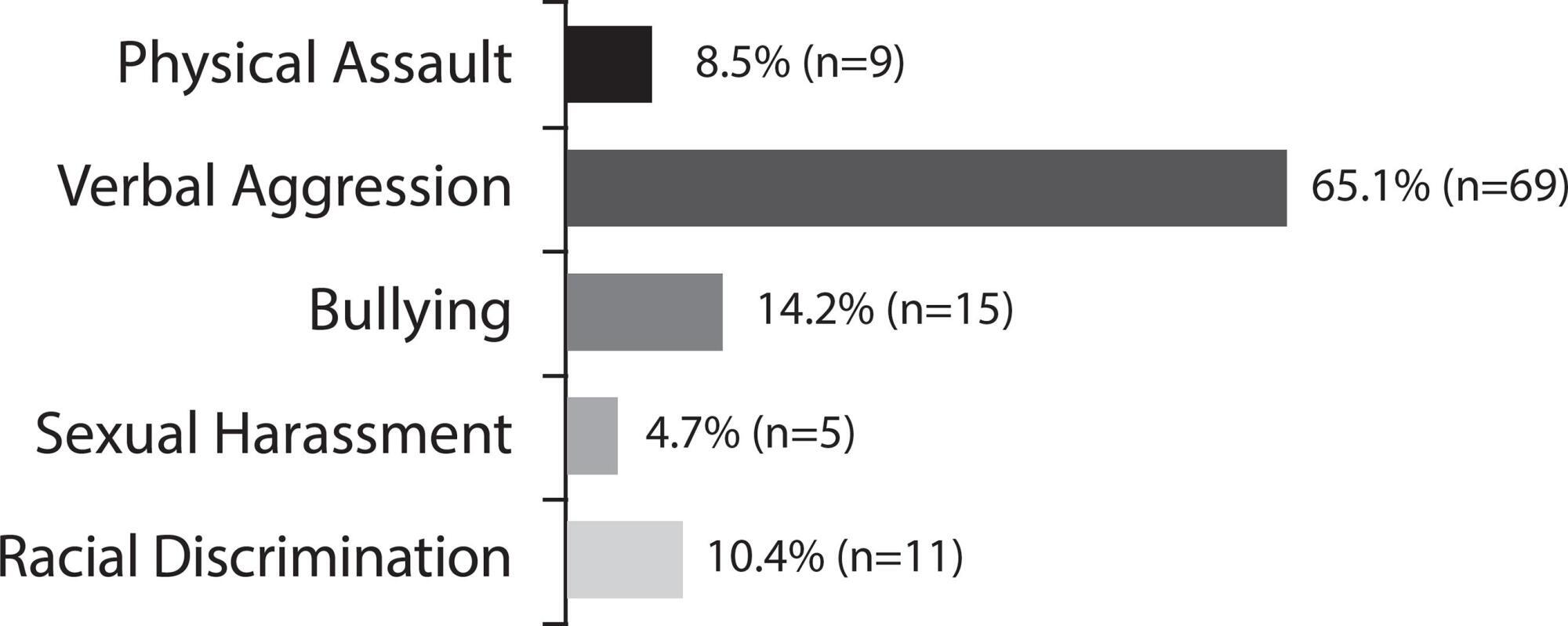
-
ORIGINAL ARTICLE09-07-2020
Profile and entrepreneurial intention of nursing students: a comparison between Brazil and Chile
Revista Brasileira de Enfermagem. 2020;73(6):e20190890
Abstract
ORIGINAL ARTICLEProfile and entrepreneurial intention of nursing students: a comparison between Brazil and Chile
Revista Brasileira de Enfermagem. 2020;73(6):e20190890
DOI 10.1590/0034-7167-2019-0890
Views0See moreABSTRACT
Objective:
to identify and compare factors associated with profile, intentions, motivations, and barriers to entrepreneurial behavior of nursing students from Brazil and Chile.
Methods:
this cross-sectional study was carried out between March and September 2018 including 889 nursing students. A form was used to assess the socio-demographic profile, professional claims, entrepreneurial intentions and motivations. Statistical analysis used Chi-Square and Fisher’s Exact tests, with a 5% significance level, and a simple logistic regression model.
Results:
there are significant differences between countries in the profile of students and in the motivations studied, but not in professional pretensions and entrepreneurial intentions. Lack of education on the subject reveals itself as an important barrier to entrepreneurship.
Conclusion:
given the lack of teaching entrepreneurship in undergraduate nursing courses and the characteristics inherent to students, education must be appropriate to different cultures to prepare future professionals for other areas of practice.
-
REFLECTION02-15-2021
The belief in health in the adoption of COVID-19 prevention and control measures
Revista Brasileira de Enfermagem. 2021;74:e20200576
Abstract
REFLECTIONThe belief in health in the adoption of COVID-19 prevention and control measures
Revista Brasileira de Enfermagem. 2021;74:e20200576
DOI 10.1590/0034-7167-2020-0576
Views0See moreABSTRACT
Objective:
Reflect, in the light of the Health Belief Model, on the adoption of behavioral measures in the context of COVID-19.
Methods:
Theoretical-reflective essay, based on the Health Belief Model, to reflect on adherence to preventive behaviors in the pandemic of COVID-19.
Results:
Adherence to preventive behaviors is strongly influenced by socioeconomic, territorial, political and individual factors in the face of critical health situations. In addition, the spread of false news modulates the thinking and execution of behavioral actions in the population.
Final Considerations:
It is necessary to understand the importance of health communication processes and the use of tools aimed at responsible human behavior and engaged in the adoption of a preventive posture.
-
ORIGINAL ARTICLE08-10-2020
Palliative care consultation team: symptom relief in first 48 hours of hospitalization
Revista Brasileira de Enfermagem. 2020;73(6):e20190391
Abstract
ORIGINAL ARTICLEPalliative care consultation team: symptom relief in first 48 hours of hospitalization
Revista Brasileira de Enfermagem. 2020;73(6):e20190391
DOI 10.1590/0034-7167-2019-0391
Views0See moreABSTRACT
Objective:
To compare the relief of symptoms provided by palliative care consultation team (PCCT) compared to the traditional care team (TC), in patients with advanced cancer in the first 48 hours of hospitalization.
Method:
Allocated to PCCT Group and TC Group, this study assessed 290 patients according to the Edmonton Symptom Assessment System (ESAS) within the first 48 hours of hospitalization. The main outcome was a minimum 2-point reduction in symptom intensity.
Results:
At 48 hours, the PCCT Group had a 2-point reduction in the mean differences (p <0.001) in pain, nausea, dyspnea, and depression; and TC Group, on nausea and sleep impairment (p <0.001). Multiple Logistic Regression found for the PCCT Group a greater chance of pain relief (OR 2.34; CI 1.01-5.43; p = 0.049).
Conclusion:
There was superiority of the PCCT Group for pain relief, dyspnea and depression. There is a need for more studies that broaden the understanding of team modalities.
-
ORIGINAL ARTICLE08-10-2020
Grounded Theory methodological aspects in Brazilian nursing thesis
Revista Brasileira de Enfermagem. 2020;73(6):e20190274
Abstract
ORIGINAL ARTICLEGrounded Theory methodological aspects in Brazilian nursing thesis
Revista Brasileira de Enfermagem. 2020;73(6):e20190274
DOI 10.1590/0034-7167-2019-0274
Views0See moreABSTRACT
Objective:
to analyze the application of methodological aspects of Grounded Theory in Brazilian nursing thesis.
Methods:
qualitative, descriptive study elaborated based on theses available in the CAPES Thesis and Dissertations Catalog, located with the search for the terms “Teoria Fundamentada nos Dados” OR “Grounded Theory”, from 2013 to 2017. The data obtained were analyzed, considering the Grounded Theory methodological assumptions.
Results:
observance of Grounded Theory basic concepts and articulation with several theoretical frameworks in the conduct of the investigations are strengthening aspects of the method. However, dissent in the description of the operationalization of the stages and naming of the elaborated construct weaken the methodological quality.
Final considerations:
the methodological consistency provided by Grounded Theory has the potential to demonstrate the studies’ rigor and reliability conducted and theories generated. It is necessary to deepen theoretical-conceptual studies to elucidate discrepancies in the applicability in nursing research.
-
EXPERIENCE REPORT06-11-2021
Care management in coping with COVID-19 at a teaching hospital
Revista Brasileira de Enfermagem. 2021;74:e20200970
Abstract
EXPERIENCE REPORTCare management in coping with COVID-19 at a teaching hospital
Revista Brasileira de Enfermagem. 2021;74:e20200970
DOI 10.1590/0034-7167-2020-0970
Views0See moreABSTRACT
Objective:
to report the experience of implementing care management strategies in coping with the COVID-19 pandemic in a teaching hospital.
Method:
this is an experience report of the managers who work at the largest public hospital in Paraná with functions as Head of the Care Management Division, Head of the Care Lines Management Sector, Head of the Infectiology Unit and support team.
Results:
care management strategies were structured based on the service dynamics; physical structure; human Resources; professional and user safety.
Final considerations:
preparing for a pandemic involves measures that include modifying infrastructure and processes, managing employees and users, infection prevention strategies, and clinical recommendations. These measures are necessary to optimize the quality of care provided to users with COVID-19 and to reduce the risk of viral transmission to other users or health professionals.
-
ORIGINAL ARTICLE12-13-2019
Factors related to quilombola attendance to child follow-up appointments
Revista Brasileira de Enfermagem. 2019;72:9-16
Abstract
ORIGINAL ARTICLEFactors related to quilombola attendance to child follow-up appointments
Revista Brasileira de Enfermagem. 2019;72:9-16
DOI 10.1590/0034-7167-2017-0605
Views0See moreABSTRACT
Objective:
To understand factors interfering with the attendance of quilombola children to growth and development follow-up appointments.
Method:
It is a qualitative research based on Symbolic interactionism, during which 14 mothers of children bellow 1 year-old were interviewed, who attended to the Family Health Unit at Ilha de Maré, Bahia, Brazil.
Results:
Appointment attendance is affected by factors intrinsic to mothers (meaning of child health follow-up; association between appointments and children falling ill; personal issues) and extrinsic factors, related to the service (availability, long waiting time for appointments and its quality).
Final considerations:
An administration prioritizing the service’s organization is required, which can prioritize attendances and the reduction of waiting time, specially given the personal issues that compromise going to the unit.
-
ORIGINAL ARTICLE12-13-2019
Nurses’ experiences in the care of high-risk newborns: a phenomenological study
Revista Brasileira de Enfermagem. 2019;72:111-117
Abstract
ORIGINAL ARTICLENurses’ experiences in the care of high-risk newborns: a phenomenological study
Revista Brasileira de Enfermagem. 2019;72:111-117
DOI 10.1590/0034-7167-2018-0221
Views0See moreABSTRACT
Objective:
To describe nurses’ experience in the care of high-risk newborns.
Method:
This is a descriptive study with a qualitative approach, based on Merleau-Ponty’s phenomenology and performed at the Fernando Magalhães Maternity Hospital in the state of Rio de Janeiro, through interviews with 30 nurses who work in neonatal care, according to the phenomenological thinking of Maurice Merleau- Ponty.
Results:
Three categories emerged: “experienced body of the nurse practitioner on the high-risk newborn”; “experienced world of the nurse practitioner on the high-risk newborn”; and “time spent by the nurse practitioner with the high-risk newborn”.
Final considerations:
The study allowed us to describe, through the participants’ speeches, that the care of the high-risk newborn is broad, that is, objective, subjective and carried out with advanced technologies, their experiences and scientific improvement are composed of shared practice and theory with the family, professionals and beginners in the neonatal universe, favoring a differentiated and humanized care.
Search
Search in:
Nuvem de Tags
Adolescente (85) Atenção Primária à Saúde (239) COVID-19 (91) Criança (91) Cuidados de Enfermagem (269) Educação em Enfermagem (151) Educação em Saúde (139) Enfermagem (930) Enfermagem Pediátrica (86) Estudantes de Enfermagem (77) Estudos de Validação (131) Família (87) Idoso (208) Promoção da Saúde (99) Qualidade de Vida (104) Saúde do Trabalhador (86) Saúde Mental (145) Saúde Pública (82) Segurança do Paciente (150) Tecnologia Educacional (100)



